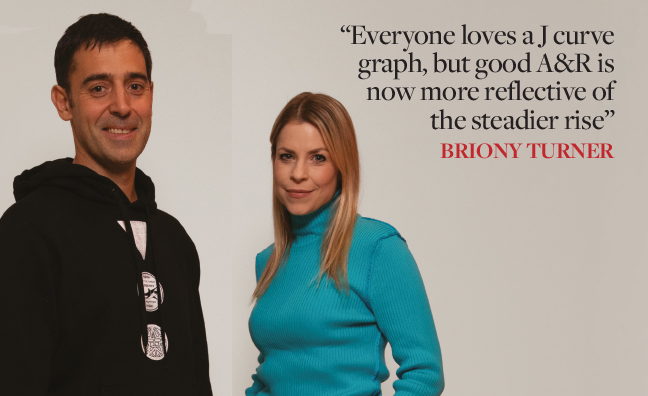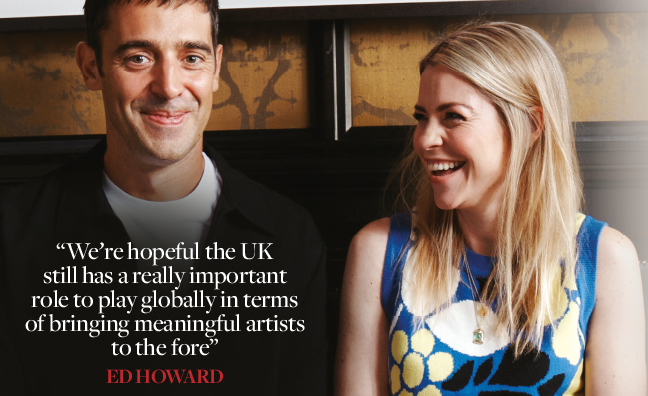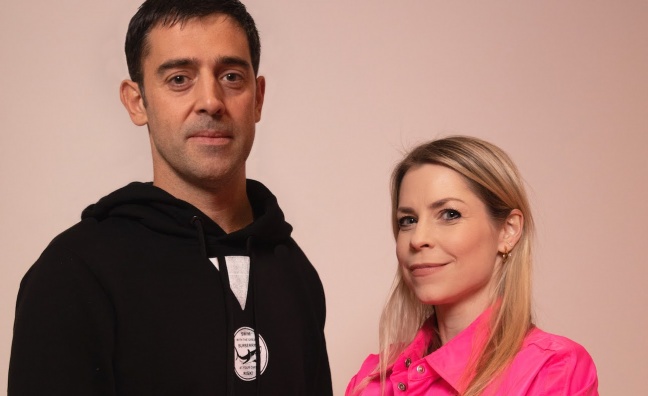Atlantic Records UK is on a hot streak with domestic acts including Fred Again.., Maisie Peters, Tion Wayne, KSI, Joel Corry, Kojey Radical, Mahalia, and more.
That’s in addition to global talent like Lizzo, Bruno Mars, Paramore and, of course, the label’s long-standing superstar, Ed Sheeran, who releases new album – (Subtract) on May 5.
The latest edition of Music Week is the only way to get the full picture direct from the top team at Atlantic. As well as our in-depth Music Week Interview with co-presidents Briony Turner and Ed Howard, we speak to key execs Damian Christian, Austin Daboh and Liz Goodwin.
Atlantic was named Record Company Of The Year at the Music Week Awards in 2022, and the Warner Music label will be defending its title at this year’s ceremony on May 24.
The label came out on top for BRITs nominations in 2023, following its successful run in the past year - including a No.1 market share finish for domestic repertoire on streaming, and also a No.1 result on airplay.
Be sure to read our exclusive with Team Atlantic in the latest edition. Here, in an excerpt from the wide-ranging interview, Briony Turner and Ed Howard talk A&R, streaming growth and exporting talent..
Beyond Atlantic, how do you think UK A&R is faring at the moment?
Briony Turner: “A&R is all about breaking artists, right? Finding, signing, nurturing, breaking and sustaining incredible talent, and I feel like it’s getting harder and harder to articulate what constitutes breaking an artist in 2023. We talk a lot about whether it’s even possible in today’s world to break an artist to the superstar status we used to. I don’t even know if there has been a superstar post-pandemic, I would say no one has evolved to that status yet. So it’s about making sure that you’re creating a sustainable business model that is bespoke to the artist, so that they can develop and scale in their own time frames.
“Obviously, everyone loves a J curve graph, but I think the steady climb is more realistic and good A&R is now reflective of the steadier curve. That requires a steady and a voluminous flow of brilliant music. Maisie Peters did that really well last year when she released three singles in between her album campaigns and Fred’s put out a huge amount of music, so I feel like being supportive of that volume – and to artists around what it requires – is a huge part of what makes a brilliant A&R these days.”
Ed Howard: “There are a lot of very talented A&Rs working in this country. The pandemic was tricky from that perspective, but when we see the artists that Briony just mentioned now coming back in front of live audiences and having an explosion of success, we’re encouraged that we haven’t actually lost our minds or forgotten how to do this.”
So you don’t feel the UK has a problem with breaking mainstream talent per se?
EH: “It’s been a tricky period, but we’re hopeful the UK still has a really important role to play globally in terms of bringing meaningful artists to the fore. We feel we’ll see more of that now we’ve got more tools back in the toolkit.”

In terms of the domestic business more generally, how do you feel it is performing right now?
EH: “My view is that we’re coming to the end of a relatively stable period of streaming growth in the industry. Not an abrupt end, but some sort of evolution into a new period where other platforms and other ways of working are going to come to the fore. While everything is financially healthy, it’s imperative that people in our positions are looking at how our companies can evolve so that we’re ahead of that curve, and that in five years’ time, we have a healthier or equally as healthy business.
“It’s not a vintage period for exporting music from the UK and I don’t think the pandemic has helped us, but there are other factors in that. We’re facing great competition from around the world and that’s awesome, so we need to push forward and regain some of that status globally. That comes down to evolving the deals we do, the artists we work with and the ways that we help them build fanbases and come to market. So I think the next three to five years is a pivotal period.”
By now, you can rely on Ed Sheeran for hit records. But how can the industry produce more big songs more often?
BT: “We’re working on it! It’s very hard for us to predict what is and isn’t a hit these days. The brilliant super skill of the A&R person in decades gone by was identifying a record, working it up and delivering a hit, because it’s a great record that ticks a lot of the musical journey boxes. These days, that isn’t what connects in the same way. It’s a powerful definitive lyric, as we’ve seen recently from Raye, for example, that connects, and then TikTok. So not over-A&Ring the songcraft part for artists at a certain part of their journey. Allowing speedy cadence and decent volume is probably more powerful for a developing artist than making the mix sound absolutely brilliant. I would say regularity of release means that you’re more likely to bump into hit records.”

EH: “And in the meantime, you’re developing an audience and a fanbase faster, so that’s also positive for the artist. I’m thinking a lot about how we take singles to market in new, unusual, exciting ways, with less pressure so that we can take those shots and it’s not so stressful. Maybe it’s about trying to have a cycle that’s a release from an artist every month rather than one every three months.”
What does it take to have singles and albums success?
EH: “I’ve been thinking about this a lot and, in a way, both are imperfect measures of success. Singles are certainly important commercially, but equally don’t necessarily mean any kind of lasting success or health for an artist. And then album success can be a one-week situation that’s very inflated and doesn’t speak to the true size or passion of the audience. So both can be achieved, but you’ve got to rewind and look at what’s happening underneath and think about the always-on approach of an artist, and what’s going on in terms of live, content, and the ways they’re engaging with an audience. That is much bigger than just a single or an album. It’s a challenging shift for businesses, but that’s where things are headed.”
Subscribers can read the Music Week Interview with Briony Turner & Ed Howard here.
Plus, click here for Damian Christian, here for Austin Daboh and here for Liz Goodwin.












